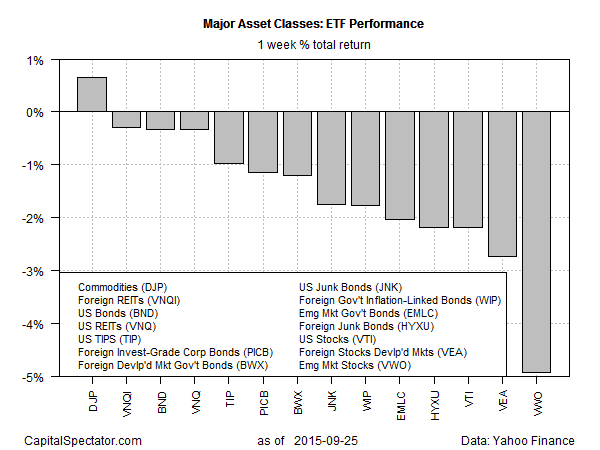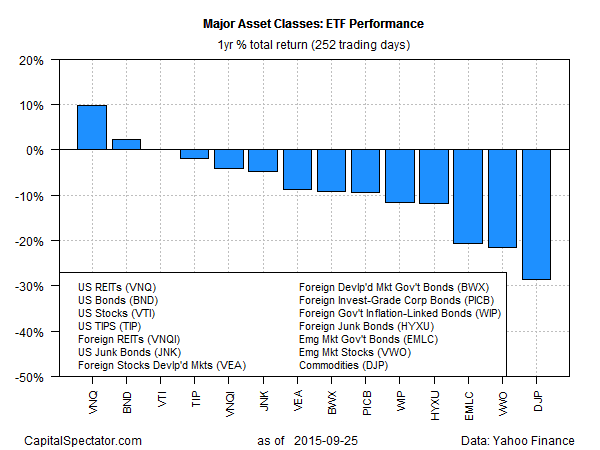Emerging Market Stocks: Last Week’s Red-Ink Leader
Value investors on the lookout for bargains have recently been eyeing up the battered corner of emerging market equities. At some point the selling will lay the foundation for a solid rebound. Judging by last week’s trading, however, there was no sign that a bullish inflection point is near. Stocks in emerging countries led the way lower last week through Sep. 25, based on the Vanguard Emerging Markets ETF (VWO). The fund was by far the worst performer among a set of proxies for monitoring the major asset classes.
VWO shed 4.9% on a total-return basis for the week just passed, well below the losses that generally weighed on markets across the asset-class spectrum. The only gain for the trading week through Sep. 25 among the ETF proxies: a 0.7% dead-cat bounce for a broad-brush definition of commodities via the iPath Bloomberg Commodity Index (DJP).

Last week’s mild pop in commodities looks like a breath of fresh air for this bruised corner, but the reprieve in the bearish momentum over the past year is probably a temporary affair. Indeed, the technical profile for commodities overall still looks ugly, which is part of the reason for the selling in emerging market stocks. Firm prices in raw materials are a key factor for boosting the economic fortunes of several emerging market nations—Brazil, for instance, which is currently mired in a deep recession.
No wonder, then, that commodities and emerging market equities have suffered the most among the major asset classes for the trailing one-year results through Sep. 25. It’s reasonable to expect that a future rebound in one will be accompanied by upward momentum in the other. But the odds are still low that we’ll see that combination on a sustained basis any time soon.

The number of money managers with “underweight” positions in emerging markets touched a 10-year high, according to September’s monthly survey of fund managers from Bank of America Merrill Lynch. “It is too early to call a bottom in emerging markets, but valuations now appear attractive,” says Ursula Marchioni, chief strategist at BlackRock’s iShares ETF division.
The market, of course, can stay irrational for longer than you can stay solvent and so the risk of trying to catch a falling knife still outweigh the potential for buying emerging-market assets on the cheap. The combination of a bear market in commodities, weaker global growth, and the possibility of a Fed rate hike—maybe—in the near term are a perfect storm for emerging markets. These conditions aren’t helping stocks in the developed world either, but emerging market equities are bearing the brunt of the rush to manage expectations down.
Disclosure: None.



